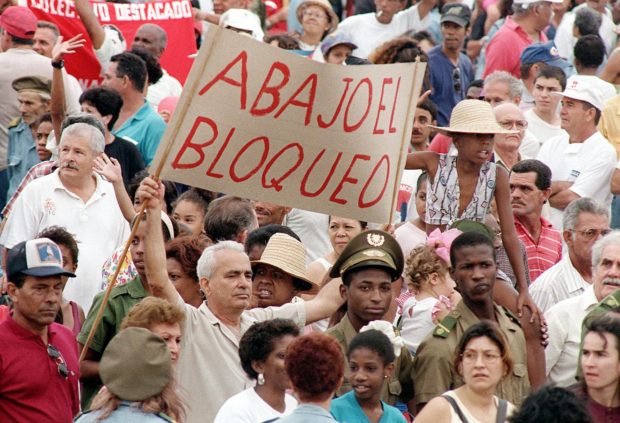
In this file photo taken on May 1, 1998 a worker holds up a sign condemning the US economic embargo against the communist nation during the traditional Labor Day parade in downtown Havana. AFP
PARIS — Cuba, living under a US embargo for the past six decades, is one of several countries to have been targeted by sanctions since the end of World War II.
Embargoes have become a weapon of choice in response to war, the fight against terrorism, or human rights breaches.
Here are some emblematic cases:
North Korea
Washington slapped a strict embargo on North Korea in June 1950 at the start of its war with the South.
In 2008, the administration of George W. Bush took North Korea off its list of countries backing terrorism, lifting old sanctions, but imposed new ones faced with the risk of nuclear proliferation.
The United Nations has also imposed rafts of sanctions since 2006, which have strengthened over the years, in response to Pyongyang’s nuclear and ballistic programs.
Vietnam
At the end of the Vietnam war in 1975, Washington imposed a trade embargo on the communist country.
Nearly two decades after the conflict ended in 1994, and eight years after Vietnam transformed into a market economy, then US president Bill Clinton lifted the embargo, hoping this would help determine the fate of missing US soldiers.
An arms embargo imposed during the war was lifted in 2016.
South Africa
The international community started sanctioning South Africa’s racist apartheid regime from the deadly repression of the Soweto uprising in 1976.
The UN imposed an arms embargo the following year and an oil embargo in 1985, which was lifted in 1993.
The then-European Economic Community, the Commonwealth and countries including the US also imposed sanctions. Apartheid was officially abolished in 1991.
Iraq
The US and its allies imposed a strict embargo on Iraq after its 1990 invasion of Kuwait.
The only exemptions were foodstuffs, medicines and basic necessities.
The hitherto prosperous oil-producing country could only export crude under the internationally supervised Oil for Food program.
In the 12 years leading up to the invasion ordered by then-president George W. Bush in 2003, Iraqis lived under rationing and with measly salaries. Iraq’s once healthy GDP was cut in half and many factories were forced to close.
Sudan
In 1997, president Clinton banned trade with Sudan, which was accused of human rights violations and of supporting terrorism.
The one exception made was gum arabic — an essential ingredient in chewing gum — of which Sudan is the world’s biggest exporter.
The embargo was lifted in 2017.
China
After the Tiananmen Square massacre in 1989, Western countries imposed an arms embargo on China.
Libya
Libya was made into a pariah by the international community in the late 1980s, accused of supporting terrorism.
Tripoli was judged to be behind the bomb attack on a US plane over Lockerbie, Scotland, in 1988, in which 270 people died and on a French UTA plane in Niger the next year, which killed 170.
In 1992-1993, an air and military embargo was imposed, bolstered by economic and financial sanctions.
Following the normalisation of relations with the West in September 2003, and Tripoli’s announcement that it was stopping the development of weapons of mass destruction, the last sanctions were lifted.
The country then fell into chaos after the fall of dictator Moamer Kadhafi in 2011, and an arms embargo was imposed.
Iran
On April 7, 1980, Washington broke off diplomatic relations with Iran and imposed a trade embargo in response to the storming of its Tehran embassy and the taking of US hostages.
In 1995, a total US economic embargo was decreed by Clinton, who suspected Iran of trying to build an atom bomb. Companies investing in Iran’s oil and gas sectors were also sanctioned.
A raft of international sanctions, targeting key sectors like defence, oil and finance, was imposed from 2006 in a bid to make Tehran give up its nuclear ambitions.
An international accord reached in 2015 on Iran’s nuclear programme unravelled when then-president Donald Trump withdrew the United States, re-imposing tough sanctions. Iran then rolled back on its commitments to drastically scale down its nuclear initiatives.
RELATED STORIES
US sanctions Cuban security minister, special forces unit over protest crackdown
UN votes overwhelmingly to condemn US embargo of Cuba
Cuba submits latest draft UN resolution against US embargo
US tightens chokehold on Cuba, blocks private charter flights